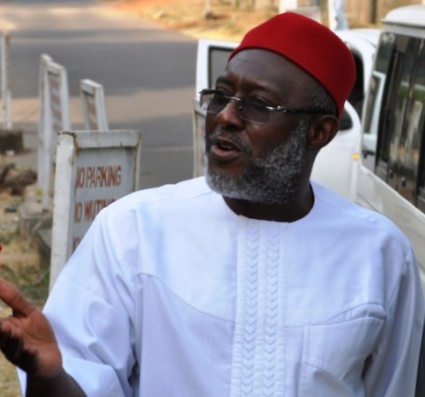Nigeria’s electoral reform and INEC’s quest for e-voting, a child of necessity

These are changing times and this year 2020 marks the beginning of doing things completely differently from the way people are used to doing it, there is what is being described as a new normal that has fallen on everyone.
Welcome to the era of coronavirus, otherwise known as Covid-19. The entrance of Covid-19 has brought with it new ways of doing things and nations around the world have started to adjust their lifestyle to align with the new normal and Nigeria is also learning to adjust its ways to the new Covid-19 order.

The need for adjustment is borne much more out of the need to create social distancing and generally maintain a new and acceptable hygienic ways of doing things to avoid being infected by the coronavirus that nations are still struggling to find cure and or vaccine for without provable success as at yet.
In Nigeria a few things have changed already, one of such is the justice system, on Monday May 4th the first virtual court session held in Nigeria at the Ikeja High Court in Lagos and it saw the sentencing to death of one Olalekan Hameed for a December 1, 2018 murder of Mrs Jolasun Okunsanya, 76, the mother of his employer, at the time.
READ ALSO: Court martial convicts 6 Air Force personnel over Badeh’s killing
Justice Mojisola Dada of Ikeja High Court gave the judgement during the virtual session via the Zoom app.
Hameed, a driver, was earlier arraigned on March 6, 2019 for the murder of Mrs. Okunsanya at her residence on plot 83, Owukun crescent, Alaka Estate, Surulere.
The court session which included the judge, defendant, his team of counsel, the prosecution team led by the Lagos State Solicitor General ,Ms Titilayo Shitta-Bey, Commissioner for Justice, Moyosore Onigbanjo (SAN), and some senior lawyers like Funke Adekoya SAN, Tayo Oyetibo SAN, Olukayode Enitan SAN, amongst others, all witnesses participated in the session remotely from different locations via the zoom app.
The proceedings were approved by Chief Judge, Justice Kazeem Alogba, in line with the Lagos State Judiciary Remote Hearing of Cases COVID-19 Pandemic Period Practice Direction.
Justice Dada conducted proceedings from High Court 10 in Ikeja, the defendant Hameed was at Kirikiri Maximum Correctional Centre, Apapa, while the counsels were at different locations.
Judicial Officers including Justice Alogba, Justice Oluwatoyin Ipaye, Justice Josephine Oyefeso, Justice Sherifat Solebo, Justice Afeez Dabiri, Justice Roli Harriman, amongst others, also participated.
This development has excited many legal practitioners who described it as a welcome development that should be encouraged across the country.
Human rights activist and Senior Advocate of Nigeria, Mr. Ebun-Olu Adegboruwa (SAN), said the move will help in making the administration of criminal justice in the country more efficient.
He said, “The proceedings of the Lagos High Court conducted online otherwise known as remote courts is revolutionary and the same thing has happened today at the High Court of the Federal Capital Territory in Abuja where three courts also sat using virtual technology.
“So, we commend their lordship because this will assist in achieving smooth and effective administration of justice.”
Monday Ubani, former 2nd Vice President of the Nigeria Bar Association, noted that while the move was innovative, the constitution needs to be amended to make room for peculiarities of virtual proceedings.
He said, “It is clearly something that some of us have been advocating for, the deployment of technology in modern day legal practice and we have been having series of lectures for lawyers to prepare for disruptions like this which will happen sooner rather than later and the pandemic has driven it home, it is now a reality.
“The court proceedings in Nigeria may begin to take a different dimension in terms of physical presence. The two events that took place in Borno and Lagos had to do with judgment, we are yet to see a virtual proceeding that encompasses a full trial.”
With this development, many political analysts are now saying this has opened doors for another possibility in the political environment, especially with regards to electronic voting.
This is why the recent position of the Independent National Electoral Commission (INEC) to pilot the use of electronic voting machines at the earliest time possible towards full introduction of electronic voting in major elections in 2021.
The commission disclosed this in a policy document titled “Policy on Conducting Elections in the Context of the COVID-19 Pandemic” signed by INEC Chairman, Prof. Mahmood Yakubu, officially released on Monday.
The commission, however, clarified that such pilot scheme would not be used for the Edo and Ondo governorship elections scheduled for September 19 and Oct. 10, respectively.
This position of the electoral umpire is in line with the agitation of some political stakeholders who have consistently argued that the nation was ripe for electronic voting and this position was further cemented by the current Covid-19 pandemic, which has made clustering around, which is one feature of voting in polling stations a taboo for now.
They had argued that if there is anywhere social distancing was required it is at polling stations where crowd of voters gather to cast their votes and in the process there is so much physical contact that could easily lead to the spread of the dreaded Covid-19, because of the inevitability of contacts at such venues.
Some of the political watchers have actually argued that at a time like this, electronic voting should commence immediately to accommodate the September and October governorship elections in both Edo and Ondo states, a position that seem to run at variance whit the decision of INEC that has ruled out such possibilities, because of the shortness of time.
In their views if the courts with minimal contacts during proceeding can seek and infact adopt virtual sitting, it will be fool hardy for any right thinking person not to immediately put modalities in place to address the issue of electronic voting in the country.
According to Uche Okolie, a political scientist, the issue of electronic voting in Nigeria is long overdue, “But thank God that the Covid-19 pandemic has come to open our eyes to the inevitability of it now.”
Okolie argues that there will be no wisdom in the Independent National Electoral Commission (INEC) calling people out at a time like this in their numbers to come and stay on the queue, pushing one another and robbing body against one another in the name of casting their votes.
Infact, he said the process of electronic voting should commence immediately with a view to accommodating the Edo and Ondo states elections which comes up in September and November of this year in the process, adding that holding elections in both states in the old order without electronic voting will not only be very dangerous, but will also be endangering the lives of the people.
However, some other political watchers have expressed the fears that INEC may not be able to achieve an amendment at the National Assembly at such a short notice to accommodate both Edo and Ondo elections in the electronic voting system, but some argue against it, saying if the judiciary can achieve it within such a short time then INEC too can, considering that it is a case of urgency and a necessity.
Those who argue for the latter notes that INEC through its modernisation plans has already put in place enabling platforms that would enhance the full implementation of E-voting in Nigeria which include the introduction of EVR, use of technologies in the accreditation of voters with the aid of SCR and transmission of election result via e-collation platform.
But that all that is needed is putting in place enabling laws for the use of technology in elections, increasing level of voters’ sensitisation, working with network providers and security agencies on network quality, cyber-attack and ensuring the recruitment of new sets of ad-hoc staff for every election and complementary ICT infrastructure.
While there are concerns about the lack of Constitutional provisions or Acts providing legitimacy for the use of e-voting, which remains a blatant challenge in Nigeria, actions can begin now to lobby the National Assembly and the various states Houses of Assembly on the need to give the enabling legislation for e-voting a speedy passage.
Though it is no secret about the various verdicts of the Supreme Court on the use of smart card readers in Nigeria which are clear indications that the deployment of technology for the conduct of election is still alien to the Nigerian constitution, much can still be done within the time available.
Another analyst, Abiodun Shoibiye, argue that while the identified challenges and more may be realistic, but that the electronic voting can still be introduced to hold along with manual voting in places with less access to internet facilities, adding however that almost every part of Nigeria are today linked by a mobile phone.
He also reasoned that if electronic voting for a programme like Big Brother Nigeria can be used and record the number of voting that came out of it from all over the country, that the nation will be deceiving itself if they think Nigerians cannot handle electronic voting.
“One of the things electronic voting will achieve for us is that a greater number of the voting public would have been taken care of by that process and the number of people that will be required to come on election day will be much fewer, thereby reducing the kind of chaos that is normally seen at polling units.
“Besides that, the issue of ballot box snatching, alteration of results at collation centre and its attendant risks will be reduced to its barest minimum.
“With electronic voting, I tell you in no time we will eliminate this idea of locking people down on a particular day just to conduct election, there will be no need for it,” he said.
Though, Mr. Gbolahan Qudus Folami, pioneer state deputy chairman of the Lagos State chapter of the Peoples Democratic Party (PDP), agrees that electronic voting is very desirable at this time, he doubt if the present system and those in positions of authority in the country will support its implementation.
“True, electronic voting is the best at this time, but you know these people how they are, they will not want to do anything to improve on the electoral system, because they are a beneficiary of the chaos in the system.
“With electronic voting you cannot write results, you know what happened in one of the states in the South East where one of the returning officers alleged that a serving governor put a gun to his head to declare results, in electronic voting such cannot happen.
“Unfortunately, this will be difficult to achieve because it cannot be rectified by law, if you look at the various states Houses of Assembly they are under the firm control of their governors, even the National Assembly is not different, so the idea of having electoral reforms in that light is not in sight.
“The only way to achieve that is by revolution, for the people to say unless this is done we are not voting again, because the present system is a colossal waste of resources, money that could have been used for something else is being wasted in this system.”
Though many would rather see that there will still be challenges even if the enabling legislation for e-voting is achieved, because however it is looked at the process comes with its own challenges, such will have to be addressed on its own merits if the process must achieve meaningful gains.
People may argue that for e-voting to be achieved the issue of regular power supply to be able to give the capacity to participate in such process must first be considered across the country.
That the problem of data which accompanies GSM in Nigeria also needs to be looked at, because this regime of data subscription which is exhausted with no transparent method of ascertaining what you paid for and the issue of voters across the various villages and in the hinterland and how to accommodate them can be part of this type of process.
Many are of the views that the most important thing at this time is to kick-start the process and that with time things will gradually fall in place, rather than sitting in one place and complaining about what is or is not practicable.








